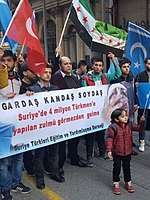Syrians in Turkey
Syrians in Turkey includes Turkish citizens of Syrian origin, Syrian refugees, and other Syrian citizens resident in Turkey. Istanbul, the most populous city in Turkey, hosts the highest number of Syrians (approximately 495,000 registered people).[2]
| Total population | |
|---|---|
| 3,589,289 registered (March 2020) [1] | |
| Regions with significant populations | |
| Mainly Istanbul with communities in Gaziantep, Hatay, Şanlıurfa, Adana and Mersin. | |
| Languages | |
| Syrian Arabic, Turkish, Kurdish, | |
| Religion | |
| Predominantly Islam with a significant Christianity minority (Syriac Christianity and Eastern Catholic) and a small number of Sabean-Mandaeans. | |
| Related ethnic groups | |
| Arabs, Armenians, Assyrians, Azeris, Iranians, Mizrahim, Turkmen |
History
Syrians in Turkey include migrants from Syria to Turkey, as well as their descendants. The number of Syrians in Turkey is estimated at over 3.5 million people as of March 2020,[3] and consists mainly of refugees of the Syrian Civil War.
In 2017, Syrian citizens accounted for 24% of all work permits granted to foreign nationals, making Syrians the largest single group of foreign nationals with work permits.[4]
Following the Turkish military intervention in the Afrin District in Northern Syria against the Kurdish YPG militia, some Turkish politicians have suggested that Syrian refugees in Turkey should be repatriated to Syria.[5]
Ethnic groups

Syrians living in Turkey are formed of various ethnic and religious groups. The majority are Arabs (including Palestinians), Syrian Turkmen and Syrian Kurds.[6]
Arabs
Turkmen
In May 2016 the Russian government-controlled news agency Sputnik claimed that there were 300,000 Syrian Turkmen refugees in Turkey.[7] By December 2016 the Turkish Foreign Ministry Undersecretary Ümit Yalçın stated that Turkey opened its borders to 500,000 Syrian Turkmen.[8]
Kurds
Others
See also
References
- "Geçici Koruma". Göç İdaresi Genel Müdürlüğü. March 10, 2020. Retrieved March 10, 2020.
- "Istanbul home to largest number of Syrians in Turkey". Retrieved 2018-06-06.
- "Situation Syria Regional Refugee Response". data2.unhcr.org. Retrieved 2018-05-13.
- "Turkey handed work permits to more than 87,000 foreigners in 2017". Hürriyet Daily News. Retrieved 2018-05-13.
- "Syrian refugees in Turkey face calls to return as public mood changes". IRIN. 2018-03-27. Retrieved 2018-05-13.
- Wahby, Sarah; Ahmadzadeh, Hashem; Çorabatır, Metin; Hashem, Leen; Al Husseini, Jalal (2014), Ensuring quality education for you refugees from Syria (12-25 year): a mapping exercise, Refugee Studies Centre, University of Oxford
- Sputnik (2016). "Ankara Wants Syria's Turkmen to Participate in Country's Management". Retrieved 11 September 2018.
According to Cavusoglu, Turkey supports Syrian people's aspiration to live in a state based on the values of pluralism and liberty regardless of ethnicity. Turkey has accepted about 300,000 Turkmen as refugees from war-torn Syria.
- Ünal, Ali (2016). "Turkey stands united with Turkmens, says Foreign Ministry Undersecretary Yalçın". Daily Sabah. Retrieved 11 September 2018.
Yalçın explained how Turkey opened its borders to 100,000 Turkmens from Iraq and 500,000 from Syria, sharing their pain and trying to mend their wounds as much as they could with economic, social and humanitarian aid.
External links
- Syrian diaspora at Flickr Commons